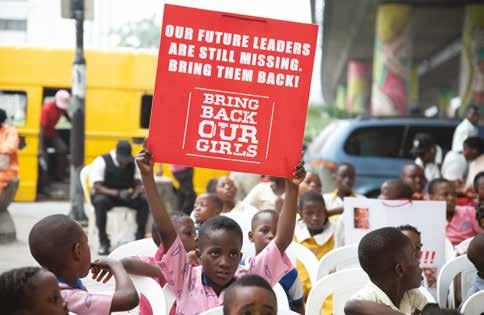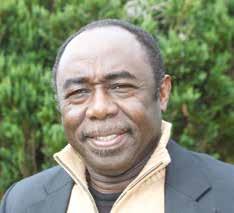
4 minute read
OUT OF THESE ASHES BEN KWASHI
For the past two decades Christians in northern and central Nigeria have endured horrendous persecution. Thousands have been killed and many more forced to flee, as Islamist extremists have waged a brutal campaign of terror. While some in the West label the situation as ‘sectarian conflict’, Christian leaders who are living and ministering in the midst of this violence are clear that this is a deliberate campaign against Christians and the Church. In response to this relentless persecution Release International’s Out of these Ashes campaign is seeking to bring this situation to the attention of Christians in the UK and to call for a renewed commitment to prayer. Here two of our partners, Archbishop Ben Kwashi of Jos and Mark Lipdo of Stefanos Foundation, explain the roots of the persecution and reflect on the current situation
The persecution of Christians has been a significant part of Nigeria’s history. By the time of Independence in 1960, the religious fault lines between Islam and other religions, especially Christianity, were already deep. The Usman Dan Fodio jihad of the 1800s had spread across parts of the north west to the central regions where the Jihadists
Advertisement

The subsequent history of Nigeria is complex as political and religious factors intertwined, often with disastrous effect. Despite a nominally secular constitution, the religious divide has become more pronounced and several northern states, starting with Zamfara, have instituted Sharia (Islamic law) from the year 2000. Resistance to the law by Christians resulted in riots and the killing of hundreds of Christians and the destruction of many churches. This set the stage for the many tragedies that followed. Radical Muslim gangs attacked and killed Christians under the pretext of blasphemy in Kano, Kaduna, Zaria, Gombe, Bauchi and many northern towns. Boko Haram, in its first online propaganda video, called for a jihad against the ‘infidels’ of Jos, central Nigeria. The group then launched its terrorism campaign against democracy and anything associated with Christianity, primarily ‘western education’ which, it claimed, was adulterating Islam and turning Muslims into infidels. Boko Haram therefore attacked and destroyed dozens of schools and kidnapped students. In 2014 nearly 300 schoolgirls were abducted in Chibok, in north-eastern Nigeria, and there have been other similar attacks since then. The Islamic terrorist group grew in influence and violence, deploying suicide bombers and attacking churches and predominantly Christian communities. It also attacked any moderate Muslim who showed any sympathy for Christians.
Radical Islamic Fulani herdsmen militia groups, associated with Boko Haram, Islamic State in West Africa and al-Qaida, also started their campaign against Christians in the predominantly central region of Nigeria, destroying more than 150 villages and slaughtering thousands of Christians, surpassing even Boko Haram in the extent of their killing. All over the north and central regions many churches continue to be targeted and destroyed, thousands of women and girls have been raped and hundreds now live with life-changing injuries and disabilities. The number of orphans, widows and vulnerable persons in IDP (internally displaced persons) camps runs into thousands. Many churches and Christian communities have been forced to pay millions of pounds in ransom to radical Islamist militia, in desperate attempts to secure the freedom of their loved ones who had been kidnapped – men, women and children, including pastors. This subjugates Christians and strategically impoverishes the communities. At least two million children have been deprived of any good education due to the ongoing attacks. The situation is such that today Nigeria is said to be one of the most dangerous countries in which to be a Christian.
It is estimated that since 2009 some 43,000 Christians have been murdered, and 18,500 abducted (never to be seen again and assumed to be dead). During the same time-frame, approximately 17,500 churches and 2,000 Christian schools were torched and destroyed. Such consistent and persistent persecution makes it surprising that in 2021, the US State Department removed Nigeria from its list of Countries of Particular Concern (nations that either engage in, or tolerate, violations of religious freedom)!
The Nigerian Government has been accused of bias in dealing with Christian persecution. It denies, deflects and defends its inability to stop the killings and threatens or arrests its critics. The Government has also found refuge in the globally acceptable narrative that the killings are caused by climate change, as Muslim herders fight Christian farmers for economic resources, and that the slow extermination has nothing to do with religious persecution. Despite the overwhelming facts of terrorism, the killing of women and children and wiping out of villages, the politically correct narratives insist ‘it’s more complicated than that’, ‘Muslims too have been targeted and killed’, ‘there are not enough facts and documentation to prove that only Christians are targeted’ and ‘the killings do not yet meet the parameters of genocide’. There does not seem to be a clear-cut path to unity in the country, and the government institutions that should have tackled the terrorism and provided justice and security have fallen far below expectations. The situation shows no signs of subsiding, especially in the north east, the north west and in the central regions. In January 2023 alone, Muslim extremists slaughtered about 60 Christians, raided churches, and kidnapped women and children. During one of these raids on a church terrorists burned the priest alive and shot and wounded his assistant priest. With the growing number of radical Islamic militia and terrorist groups, this can only mean that the persecution of Christians is likely to continue for a long time until there is a clear acknowledgment of this unfolding tragedy and the political will to stop it.
One thing, however, is certain: We will not deny the Lord or bring disgrace to those first missionaries who gave their all in order to bring Christianity to these shores. We have a gospel worth living for, and a gospel worth dying for!







